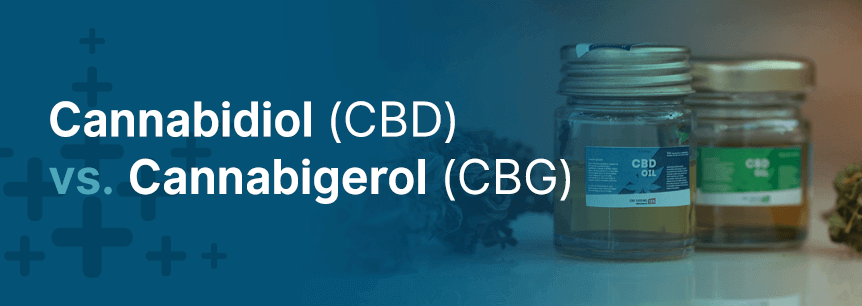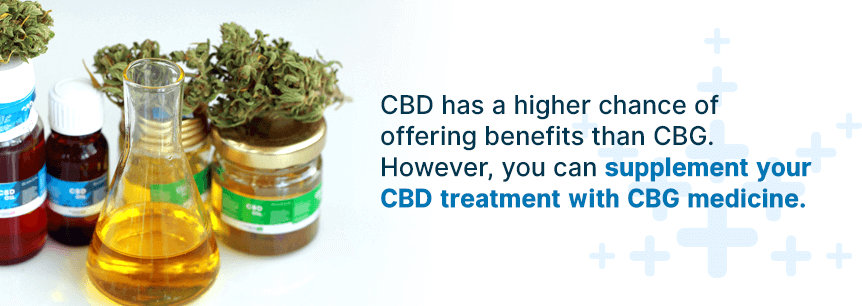
Marijuana has hundreds of compounds that each have their own health benefits, which is why the cannabis plant is more like a medicine cabinet than a single medication. By isolating the compounds we need, we can create medicine for all sorts of health issues. Medical marijuana experts focus on cannabinoid compounds when examining cannabis’ components. You may already know about cannabidiol (CBD), a popular wellness ingredient. But, what about cannabigerol (CBG)? These cannabinoids both have health benefits, but they help you in different ways.
When you understand how cannabinoids work with the human body, you can make an informed decision for your well-being. Let’s talk about the differences between CBD and CBG and how you can benefit from each compound.
The compound known as cannabidiol (CBD) is one of two primary cannabinoids in marijuana. CBD and THC have some of the highest concentrations in the cannabis plant compared to other cannabinoids. THC causes the “high” we associate with marijuana, but CBD has no psychoactive effects. This lack of impairment makes CBD a popular choice for many patients. Patients use CBD to relieve pain, mood disorders, sleep problems and many more symptoms.
In the young cannabis plant, CBG acts as the first form of CBD, THC and cannabichromene (CBC). CBG is a member of the CBG group of cannabinoids that includes cannabigerolic acid (CBGA). The enzymes in a young marijuana plant turn CBGA into cannabidiolic acid (CBDA), tetrahydrocannabinolic acid (THCA), or cannabichromene acid (CBCA). These acids then break down into CBD, CBC or THC. Research suggests that CBG can kill bacteria, reduce inflammation, relieve pain and resolve even more symptoms.
Cannabinoids have such an impact on our health because they work with our natural systems. We each have an endocannabinoid system (ECS) that uses and makes cannabinoids. When a cannabinoid attaches to one of the system’s CB1 or CB2 receptors, it regulates our bodily functions. CBD and CBG have different interactions with the ECS that provide unique benefits.
CBD works by enhancing the ECS’ ability to relieve symptoms. It does not attach to the CB1 or CB2 receptors like most other cannabinoids. Instead, it blocks the fatty acid FAAH, which breaks down the endocannabinoid anandamide. Our bodies create anandamide, and it attaches to the CB1 receptor to impact our nervous systems. Some people have an anandamide deficiency or need extra anandamide to relieve their symptoms. With FAAH blocked, anandamide can stay in your system for a longer time in higher amounts.
Meanwhile, CBG seems to act as a partial agonist of the CB1 and CB2 receptors. This means it activates these receptors, but only to a certain extent. While CB1 receptors affect the brain, nerves and spinal cord, CB2 receptors influence the immune system. Since CBG binds to both types of receptors, it benefits all of these parts of the body.
The scientific community is at the beginning of their journey into medical marijuana research. In the United States, we have few studies on cannabinoids and marijuana because of its status as a Schedule I drug. Our current data shows plenty of promise, and we can’t wait to see what we discover in the future. While we have a small number of studies overall, there is still a gap between the amounts of CBD and CBG research out there.
We have much more data on CBD than we do CBG. CBD will also have more potential for research in the future because of the FDA’s approval of Epidiolex. Epidiolex is a CBD oil that received a Schedule V status from the DEA in September 2018. Since it has such a low schedule, researchers have an easier process to go through when they want to study it. The DEA’s decision doesn’t affect other types of cannabis medicine, so cannabinoids like CBG still require an extensive approval process.
You can find more CBD products available than CBG products. We have anecdotal and scientific evidence that shows CBD’s effectiveness, but we don’t have much information about CBG. As a result, most producers focus on CBD instead of CBG. Certain growers breed CBG-rich strains, such as Exodus Cheese and Williams Wonder. Otherwise, they don’t create products such as oils or topicals. Natural health stores and dispensaries sell CBD medications of varying effectiveness. CBD that comes from a dispensary tends to have a higher level of quality than the CBD you get online or over-the-counter.
If you have to choose between one or the other, CBD has a higher chance of offering benefits than CBG. However, you can supplement your CBD treatment with CBG medicine. CBG has not been found to cause any harmful effects — in fact, it may even enhance the benefits you get from CBD so you can feel more relief. The availability of CBG will depend on your state and your status as a registered medical marijuana patient.

For the best treatment results, we recommend seeing a cannabis-trained medical professional. They can help you understand your treatment options in your state and assist with signing up for a medicinal cannabis card. You may not need to get a patient ID to buy CBD medicine. Whether you need one or not, your physician will give you advice for the next steps in your medical marijuana journey.
At MarijuanaDoctors.com, we strive to give you the latest information on everything related to medical marijuana. We cover topics like state laws, treatable conditions and available care providers. Another subject we discuss is cannabinoids and the other compounds in marijuana.
To compare CBD with the cannabinoid CBN, you can visit our blog post on the topic. You can also find more information about CBD’s use as a medicine in the CBD Resources section of our blog.
No Information on MarijuanaDoctors.Com should be used to diagnose, treat, prevent or cure any disease or condition. You can view our Full Disclaimer here.